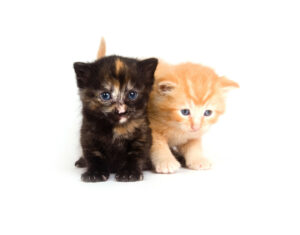Barks Blog
Feline Behavior Unmasked: Kitten Socialization
By Francine Miller

Q: Should I socialize my kitten? I’ve heard that this is important for puppies, but is it important for kittens too?
A: Yes! Although very few people are aware of how important this is, the socialization period is the time when all primary social bonds are formed and constitutes the single most important period during the cat’s life. During this phase, striking behavioral changes occur because of growth and experience. Socialization can occur between a kitten and humans, or between a kitten and its “natural enemies,” such as dogs. Additionally, this is the time that cats learn to tolerate other cats, if not fully accept, other cats in social situations.
When a kitten misses out on socialization during this period development of behavioral problems such as play aggression, inappropriate play behavior, and fear aggression may occur.
Critical Period
The critical period for kitten socialization usually occurs during the early weeks of a cat’s life starting between 2 to 7 weeks of age (early socialization occurs between 3-8 weeks, late socialization between 9 and 16 weeks). During this period, the cat learns to become used to sights, sounds and smells as well as how to interact appropriately with other cats, people, and other animals. A young kitten has a fearless, exploratory nature during the socialization period. They may startle easily, but they recover quickly.
The amount of handling a cat receives, the age at which it occurs, and the number of handlers all affect the degree of friendliness towards people later in life. Frequent gentle handling and play with varied people including men, women and supervised children is ideal. It is important to encourage the cat to be comfortable with being held, picked up and touched in different places, such as the ears, paws and belly. You can socialize a kitten very well in as little as 15 minutes of daily handling during the sensitive period. Cats that have been handled by only one person can be held for, on average, twice as long by that person than by any other, but cats with experience of four handlers will stay with any person, including a stranger (the multiperson cat becomes socialized to all humans that behave in broadly the same way). Kittens can do this easily until they reach the end of the socialization period where they become naturally wired to be more suspicious of things they haven’t experienced yet, so that the cat can react more cautiously to new things in the environment, such as potential predators.
Socialization Schedule
You can create your own socialization schedule for your new kitten. For example, get your kitten used to guests in the home (so your new kitten doesn’t spend the rest of her life hiding when guests visit). You can easily do this by inviting friends over for coffee or dinner and finding ways to make the experience rewarding for the kitten. Encourage the kitten to approach your guests and reward her with tasty treats when she does so. Ask your friends to help by playing with her (with a familiar toy) and petting her if she is comfortable with it – accompanied with treats. You could even desensitize and countercondition the kitten to the sound of the doorbell and a knock on the door as these are most often a signal for the cat to run and hide. During this time, you can also introduce tooth brushing, pilling, giving liquid medications via syringe, gentle examination of ears, teeth, nails and grooming, training to a harness and leash for walks outside, car rides, nail clipping, bathing, etc.
Want to learn more? Consider basic training for your cat. See Clicker Training for Cats, BARKS from the Guild, November 2017, pp. 16-23 for some ideas. You may also be interested in a new book by John Bradshaw and Sarah Ellis, The Trainable Cat, a Practical Guide to Making Life Happier for You and Your Cat.
Resources
Bradshaw, J., & Ellis, S. (2016). The Trainable Cat: A Practical Guide to Making Life Happier for You and Your Cat. New York, NY: Basic Books
Garber, P., & Miller, F. (2017, November). Clicker Training for Cats. BARKS from the Guild (27) 16-23. Available at: https://issuu.com/petprofessionalguild/docs/bftg_nov_2017_online_edition_opt_1/16
About the Author
Francine Miller is an applied animal behavior counselor and associate certified dog behavior consultant (IAABC certified associate) who has 13 years experience treating dogs and cats with behavior problems. She currently offers house calls for behavior consultations throughout San Diego County, California under the business name, Call Ms Behaving, and overnight pet sitting in the area around Carlsbad, California where she resides.
